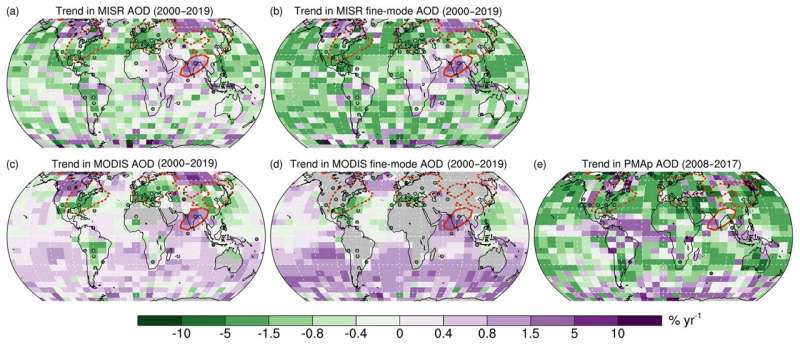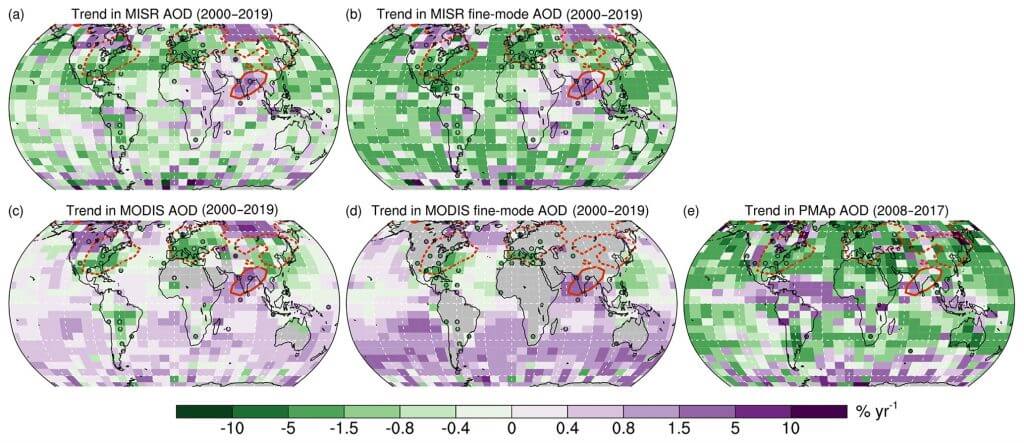
An international research team led by Leipzig University has used satellite data to demonstrate that concentrations of pollutant particles have decreased significantly since the year 2000. This is necessary due to their impact on health. But it is also of great significance because it has reduced the particles’ cooling effect on the climate. The study findings have been published in the journal Atmospheric Chemistry and Physics.
Global warming is caused by the emission of greenhouse gases. According to the Intergovernmental Panel on Climate Change (IPCC), by 2019 the temperature had risen by 1.1 degrees Celsius compared to pre-industrial levels. However, at the same time, the combustion of fossil fuels emits aerosols, in the form of pollutant particles such as soot or sulfuric acid, which cool our climate.
They reflect sunlight and also increase the reflectivity of clouds. According to the IPCC, the presence of aerosols in the atmosphere caused the climate to be 0.5 degrees Celsius cooler in 2019 than without them. Other effects such as land use change also play a role.
Study documents widespread evidence of this reduced cooling climate effect
In a new international analysis, Professor Johannes Quaas, a meteorologist at Leipzig University, and colleagues from across Europe, China, and the US have now documented robust evidence of this effect on the climate of improved air quality.
“We analyzed data from NASA’s Terra and Aqua satellites. They have been providing comprehensive satellite observations of the Earth since the year 2000, measuring incoming and outgoing radiation, but also clouds and aerosol pollution. The latter has decreased significantly across North America, Europe and East Asia since 2000,” says Professor Johannes Quaas, lead author of the study, which was initiated in a meeting by the two European research projects CONSTRAIN and FORCES.
Reduction in aerosol-induced cooling increases warming due to CO2 since 2000 by up to 50%
This has also reduced the cooling effect of aerosols. Compared to the year 2000, it has led to an increase in the warming effect that is up to 50% of the one by CO2 increases in the same period. This means an acceleration of the drivers of global warming compared to the previous period.
“Our study should not be interpreted to mean that we should now be emitting more aerosols to cool the climate. On the contrary: aerosols are harmful to human health and the environment, which is why we need to keep reducing emissions,” Quaas concludes. And it is why air quality legislation has become increasingly stringent since the 1970s and is being implemented by more and more countries.
Professor Quaas and his colleagues on the new study stress the ever more urgent need for rapid and deep reductions in greenhouse gas emissions.
Explore further
Johannes Quaas et al, Robust evidence for reversal of the trend in aerosol effective climate forcing, Atmospheric Chemistry and Physics (2022). DOI: 10.5194/acp-22-12221-2022
Improved air quality found to have accelerated global warming in recent decades (2022, September 21)
retrieved 22 September 2022
from https://phys.org/news/2022-09-air-quality-global-decades.html
part may be reproduced without the written permission. The content is provided for information purposes only.

